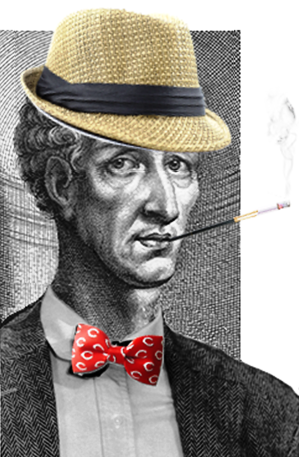 |
| Der Philosoph |
“The time has come,” the Walrus said,
“To talk of many things:
Of shoes – and ships – and Cousin Jack”
My cousin Jack has appeared in these pixels before. (See here, here and here.) But I haven’t told his story, and it seemed right to tell some of it before outing him in what follows. Jack Cousins was born in the year of his birth and disappeared on the day of his disappearance. In between he was the sunniest child of us all and the most bitter young man, running smack dab from one into the other, straight from five before noon into one a.m., for no reason that anyone else could tell – no one pushed him that any of us knows of. No reason that anyone can tell, and he was never in the mood to explain.
To call his black humor a “mood” is to trivialize it, which is exactly what he would wish, but his deep, deep pessimism – in the philosophical sense: his absolute certainty that we lived in the worst of all possible worlds – was real as well as philosophical: It was a habit of heart as much as head, in his spirit as in his blood as in his brain.
So he left college when we all did, pre-medical degree in hand, took a year, as he said “to find myself, because I have quite clearly gone missing,” and entered seminary. A year later he dropped out. He dropped in and out and in and out again, graduated “with highest downers” (his words), and was ordained by the Presbyterian Church, which he served in “the smuggest and dowdiest, leanest and most crapulous parishes” in the Carolinas, three of them in eleven years until the day he served no longer, giving three weeks’ notice effective the end of his three weeks’ vacation. In short, he wouldn’t be back. Indeed, the notice indicated that I would come in and box up his things and collect whatever might be due him or nothing at all he didn’t care peace be with you and your legitimate and illegitimate children now and for ever and ever more amen.
As far as any of his siblings, cousins, and friends could tell, Jack had withdrawn all he had invested anywhere, a tidy sum, especially given his dusty way of living. There were left for me to collect at his office a thousand books (close to five hundred commentaries) and two crammed file cabinets of papers and from his apartment four plates, four knives four forks, four spoons, a fry and a sauce pan, a wooden spoon and a spatula, a desk and chair, a mattress on the floor and two lamps, and, finally, a large assortment of mechanical pencils.
This was eighteen years ago this week. I have not seen him since nor heard from – or even about – him except through Uncle Albert (who is not Jack’s uncle either; see here), who gets, he says, very occasional post cards from “an undisclosed province of our neighbor to the north.” I once asked Uncle A if the post cards were in French, thinking to narrow the search if I ever decided to undertake it. “Yes,” he said, “and in English as well, with smatterings of Greek, Hebrew, and, I believe, Sanskrit – I can’t read it.” “Do you write him back?” “Didn’t I just say I don’t know Sanskrit?”
This could be a romantic tale of sorts were not Jack, as I said, the deepest, darkest pessimist I have ever known even if laughing all the way. “And if the laugh is bitter,” he said once, quoting Nathanael West if I’m not wrong: “If the laugh is bitter, I must laugh at the laugh.” I suspect it was West. Jack did love West. And Swift. And Juvenal. And Evelyn Waugh.
I started rooting around in his papers three years ago – almost entirely sermons and pages and pages and pages of notes on the passages he preached from, all handwritten, both sides of the page but every other line: long quotations from commentaries, interspersed with observations, interpretations, and explanations of his own, some of which responded directly to the commentators, much of which veered off on tangents heading into the night. For example . . . I pulled this out from the second of three folders on Jonah – because today’s Old Testament reading is Jonah 3:1-5. It is, as much of Jack’s writing is, stitched together with “so,” because for him one damn thing does follow the other.
One other thing to say about Jack’s writing: he doesn’t have, or he doesn’t often exercise, the gift for euphemism of Uncle Albert.
a








